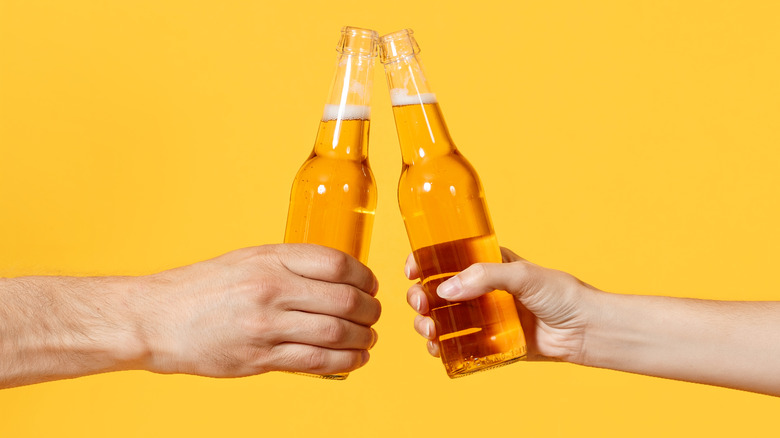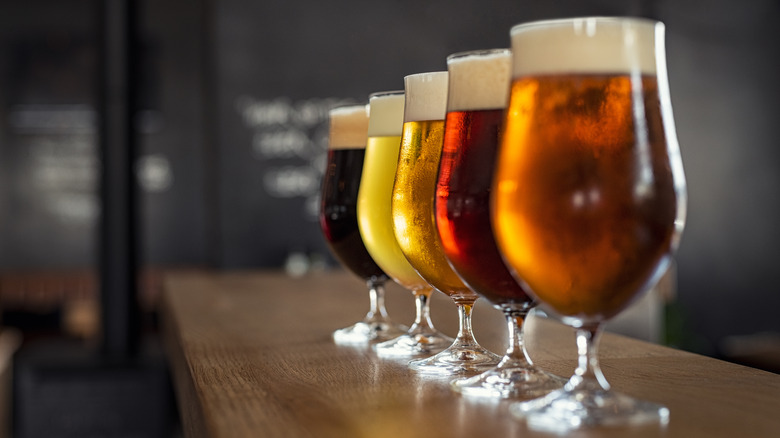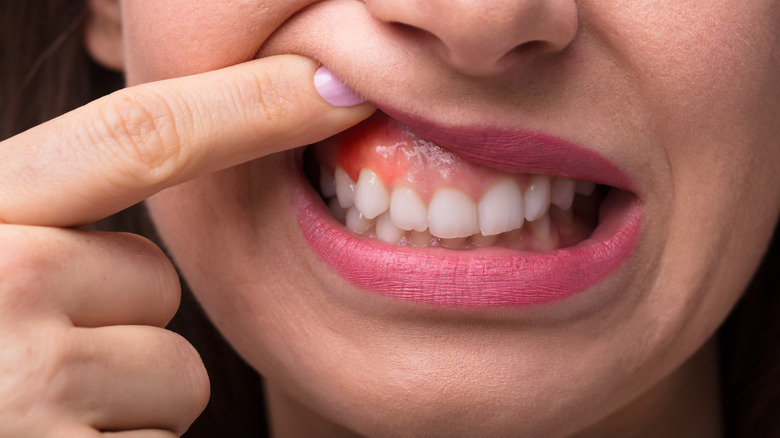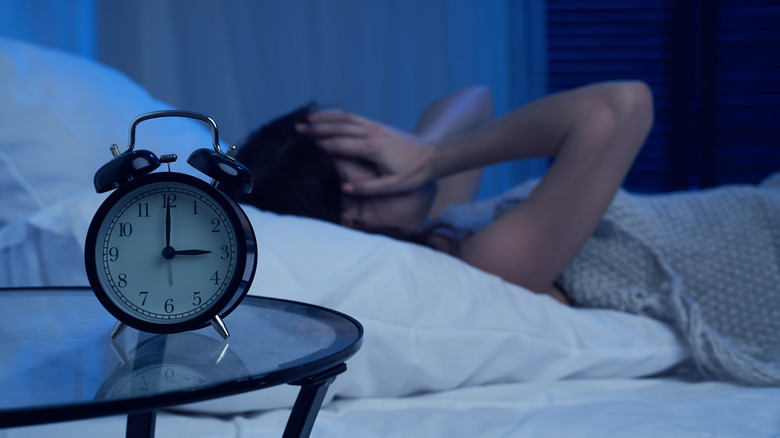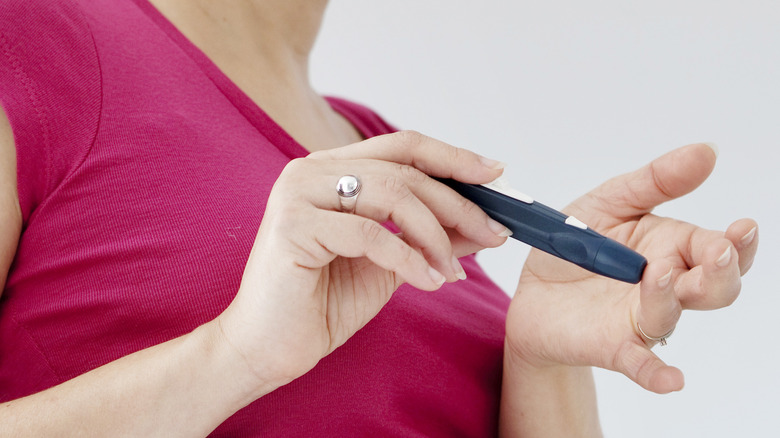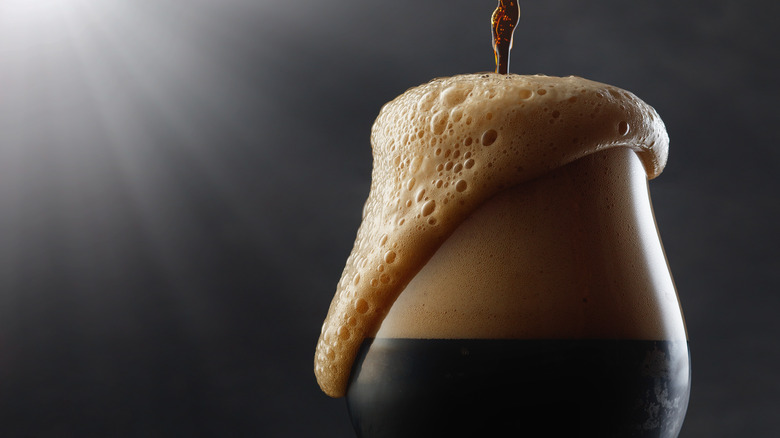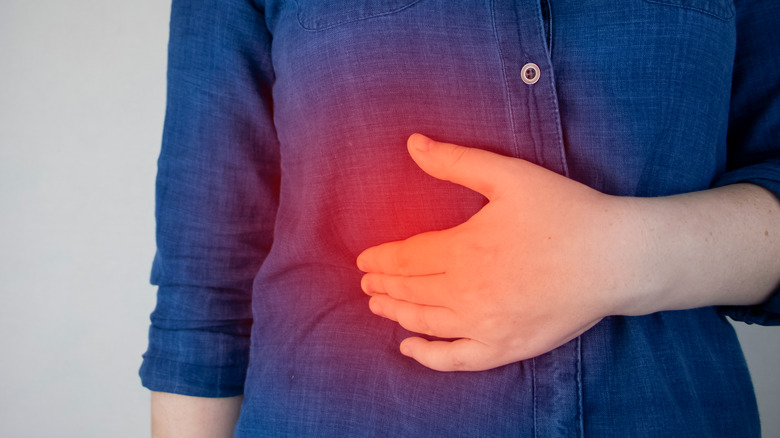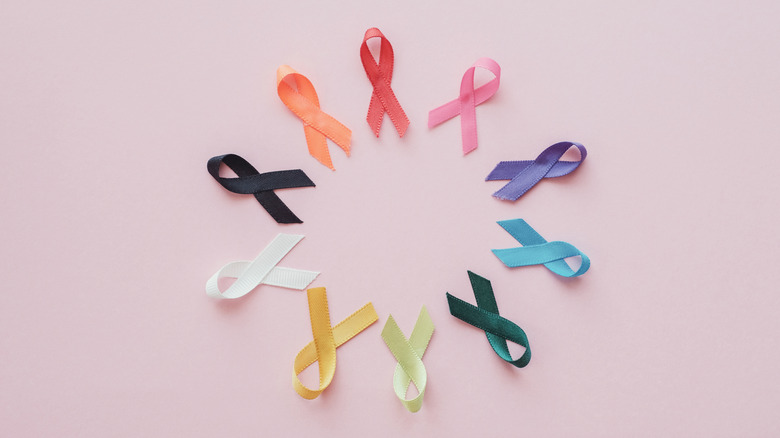What You're Really Doing To Your Body If You Drink Beer Every Night
Beer is big business. According to the Brewers Association, the U.S. beer market's sales came in at $94 billion in 2020, a testament to the drink's ubiquitous popularity. And for many, the day simply isn't complete without cracking open a cold beer at the end of it to unwind. But as with all things done regularly, drinking beer every night is not without its effects on the body.
While the 2020-2025 Dietary Guidelines for Americans advises a max of two drinks per day for men and one drink or less per day for women, daily intake of alcohol (as well as the carbohydrates and other components found in beer) could be having an impact on your health.
And if you're someone who drinks more than moderately — as two out of three people do at least once per month, according to the CDC – the beer you're imbibing nightly could be doing more harm than good. Let's take a look at what really happens to your body by drinking beer every night.
You may find yourself gaining weight
Alcohol contains 7 calories per gram, according to Harvard Health Blog, and with beer also coming in relatively high in carbohydrates (about 13 carbs a can) due to its starch content, it's fair to say that drinking it regularly may boost your daily caloric intake, potentially resulting in weight gain (via Healthline).
As registered dietitian nutritionist at Hilton Head Health, Elizabeth Huggins, explained to Eat This, Not That, "Calories in beer can range from as low as 60 to as high as 240 calories per 12 ounces." She continued, saying this habit "can lead to weight gain, especially if your beer enjoys the company of snacks."
How your body orders the fuel that it burns is another factor in how beer can cause us to gain weight. Dr. Michael Jensen, an endocrine expert and obesity researcher with the Mayo Clinic in Rochester, Minnesota, explained to WebMD, "In general, alcohol intake is associated with bigger waists, because when you drink alcohol, the liver burns alcohol instead of fat." While beer specifically isn't a cause of weight gain, the excess calories and how your body handles it can be.
Drinking beer every night could increase your mortality risk
It's sobering to know that drinking beer every night could increase your mortality risk. "It used to seem like having one or two drinks per day was no big deal, and there even have been some studies suggesting it can improve health. But now we know that even the lightest daily drinkers have an increased mortality risk," according to physician Sarah M. Hartz, who spoke to Medical News Today about a study she led.
In the 2018 study, published in Alcoholism: Clinical & Experimental Research, Hartz and her team examined two data sets from over 400,000 individuals, examining the link between self-reported alcohol intake and mortality from people aged 18 to 85. They found that individuals who drank one or two drinks consistently over four or more nights per week were 20% more at risk of early death, across all age groups, compared to participants who drank three times a week or less. While you may be drinking within the guidelines, bear in mind that the frequency with which you drink also matters.
You could find that your oral health suffers
It's not just beer breath that can be an issue if you're drinking the beverage every night. Daily alcohol intake, specifically beer, can have numerous consequences for your oral health. Just as red wine can stain and discolor your teeth, some types of beer can have a similar effect, according to dentist Joseph Banker. Speaking with Healthline, Banker explained, "Beer is acidic just like wine. That makes teeth more likely to be stained by the dark barley and malts found in darker beers."
If you drink beer above moderate levels regularly, it can have some more profound effects on your oral health. As Healthline indicated, alcohol abuse is the second most prevalent risk factor for oral cancer, with tobacco use being the highest. Heavy alcohol intake also puts you at higher risk of gum disease, tooth decay, and having higher plaque levels.
A beer before bed could wreak havoc on your sleep
Daydreaming about a nightcap? While alcohol has a reputation for helping people drift off, the relationship between alcohol and sleep may be a little more complicated. In fact, according to nutritionist Katie Boyd, beer can harm your sleep. Speaking to Eat This, Not That, Boyd said, "Drinking too much beer can cause sleep disruption because it causes your insulin to spike in the middle of the night if drank later in the day, thus causing you to wake up. In the morning, you end up feeling groggy and not optimal for the rest of the day."
In addition to insulin production, drinking beer nightly can also suppress your REM sleep cycles, the stage of sleep needed for memory reconciliation, learning, and mood, leading to less restful and lower-quality sleep (via National Sleep Foundation). And while alcohol can help with sleep onset, it can often result in disrupted sleep and insomnia, meaning that your sleep overall won't leave you feeling as restored as normal sleep induced without alcohol might.
If you're drinking more than a few beers every night, your eyesight could suffer long term
If you've ever had a little more booze than you were planning to (we've all been there), you might be familiar with a bit of temporary haziness or double vision. Drinking beer every night, however, can cause a longer-term impact on your eyesight, particularly if you're drinking more than just a few nightly.
Dr. Alexander Ionides, a consultant ophthalmologist at Clinic Compare in the U.K., told The Independent, "If you regularly drink large volumes of alcohol, you're at a higher risk of developing eye conditions that will alter your vision and cause permanent damage. Repeated episodes of heavy drinking puts significant strain on the liver and, just as the eye is associated with many other organs of the body, heavy drinkers will be more prone to eye conditions and declining eyesight."
Instead, Ionides recommends sticking to the recommended intake of alcohol per day. As Ionides said, "our bodies are all different, meaning our reactions to alcohol will also be extremely varied, but it's wise to always consider the recommended units of alcohol. ... Sticking to these guidelines will help you maintain bright, healthy eyes."
Drinking beer moderately could lower your risk of diabetes
Drinking beer every night in moderation could just lower your overall risk of developing diabetes. A 2017 study published in Diabetologia examined the risk between alcohol consumption and diabetes with attention to specific drinking patterns among over 70,000 people in Denmark over almost five years. It was found that moderate consumption of alcohol over three to four days a week resulted in a lower risk of diabetes in men and women.
While this may seem like good news, it's important to point out that, as WebMD stated, beer contains carbohydrates that can spike your blood sugar, which can be problematic if you're diabetic. Alcohol can also negatively interact with certain diabetes medications. As such, always make sure to consult with your doctor about drinking beer if you do have diabetes, to establish how you can do so without any negative consequences.
Drinking beer could give you stomach problems
Beer may taste good, but your gut may not be thankful for you drinking it every night. A nightly can or two of beer can cause a fair few digestive problems, according to nutritionist Katie Boyd. She told Eat This, Not That that drinking beer on a regular basis "causes bloat and can irritate your digestive tract." She explained further, saying, "Drinking beer can make your stomach produce more acid than usual, which can turn into inflammation of the gut lining. This can have long-term side effects like gastritis. They don't call it a 'beer belly' for nothing."
Gastritis is a condition that can be unpleasant to deal with. Commonly characterized by a burning sensation in the upper abdomen, gastritis is caused by alcohol through the erosion of the stomach lining, causing the stomach to become more easily irritated by digestive fluids (via Mayo Clinic). While gastritis often clears up on its own, untreated gastritis can lead to stomach ulcers or stomach bleeding. Be on the lookout for any symptoms, and be aware that a nightly beer may not be the best thing for your stomach.
Drinking beer every night could help your heart (maybe)
With heart failure included on 13.4% of death certificates in 2018, it's understandably a huge concern (via CDC). That's why it's useful to note that drinking beer every night could help reduce your risk of heart failure.
According to a 2015 study published in the European Heart Journal, light intake of alcohol was associated with a lower risk of future heart failure, with the study's authors finding that "alcohol consumption of up to 7 drinks/week at early-middle age is associated with lower risk for future HF [heart failure], with a similar but less definite association in women than in men. These findings suggest that despite the dangers of heavy drinking, modest alcohol consumption in early-middle age may be associated with a lower risk for HF."
However, it's important to point out that drinking alcohol as a means to reduce heart failure or heart disease risk may not be the best strategy. As cardiologist Leslie Cho told the Cleveland Clinic about the use of alcohol to help with heart disease, "It's better not to drink any alcohol at all."
You risk developing a dependence
Drinking beer regularly may not be cause for concern, but it's important to stay alert to your drinking habits. Equally as important is to understand the distinction between alcohol dependence and alcoholism. Speaking to Men's Health, George Koob, director of the National Institute on Alcohol Abuse and Alcoholism, explained, "Dependence often goes hand in hand with addiction, but they're not the same things. You can become dependent on almost any substance if it's part of your daily rhythm, but that doesn't mean you're addicted."
Where alcohol dependence and alcoholism differ is in the ability to stop. Dr. Lawrence Weinstein, physician chief medical officer at American Addiction Centers, told WebMD, "Inappropriate use can occur, but the person can choose to stop" and "additionally, this inappropriate use may not impact various aspects of the person's life." However, dependence can lead to addiction, which is characterized by being unable to choose to stop drinking alcohol.
If you or anyone you know is struggling with addiction issues, help is available. Visit the Substance Abuse and Mental Health Services Administration website or contact SAMHSA's National Helpline at 1-800-662-HELP (4357).
You could wind up with stronger bones
Beer builds stronger bones? This is an unexpected consequence of drinking some brewskis, it may just be the case. According to WebMD, beer can contribute to better bone health due to its high silicon content, with hoppier beers higher in silicon due to the presence of more barley.
As Charles Bamforth of the department of food science and technology at the University of California, Davis told the site, "Wheat contains less silicon than barley because it is the husk of the barley that is rich in this element. While most of the silicon remains in the husk during brewing, significant quantities of silicon nonetheless are extracted into wort and much of this survives into beer."
Although calcium is commonly cited as the nutrient you need for bone health, silicon could play a vital function too. A study in The Journal of Nutrition, Health and Aging showed the benefits of silicon to bone health, drawing the link between silicon consumption and collagen synthesis. Study author Dr. Ravin Jugdaohsingh noted that "accumulating evidence over the last 30 years strongly suggest that dietary silicon is beneficial to bone and connective tissue health."
You're at increased risk of liver disease if you drink beer regularly
When it comes to handling alcohol, the liver takes on a lot of the work. As one of the primary organs for processing toxins, regular intake of alcohol can cause strain and damage to the liver, leading to an increase in the risk of liver disease (via Johns Hopkins Medicine).
One way in which the liver is impacted by alcohol is through the development of "fatty liver." As gastroenterologist K. V. Narayanan Menon told the Cleveland Clinic, "The oxidative metabolism of alcohol generates molecules that inhibit fat oxidation in the liver and, subsequently, can lead to a condition known as fatty liver."
According to Healthline, fatty liver can cause discomfort in the abdomen area and fatigue, and if untreated can develop into alcoholic hepatitis, a more profound disease. If damage continues to occur to the liver, it can result in alcoholic cirrhosis, an irreversible and serious condition that can result in serious medical consequences. As such, if drinking beer every day, be sure to consider and stick to the recommended intake.
Your beer habit could put you at increased risk of cancer
With cancer accounting for almost 10 million deaths worldwide in 2020 alone, doing what you can to reduce your risk of developing cancer is advisable (via (via WHO). Unfortunately, drinking beer every night could put you at increased risk of developing various types of cancers.
While the biggest risks come with drinking in heavier amounts, even moderate drinking has been linked to certain cancers, as a 2015 study in The BMJ found. The study examined the link between alcohol intake and cancer risk, and found that even light drinking of up to one drink a day could lead to an increased likelihood of alcohol-related cancers, especially breast cancer.
The study also pointed to the fact that heavier drinking is associated with higher cancer risks for various types of the disease, including, as the American Cancer Society revealed, throat, mouth, liver, colorectal, and potentially stomach cancers. The American Cancer Society recommends keeping your intake of alcohol to no more than one drink per day for women, and two drinks per day for men.
Having a beer each night could benefit your immune system
Drinking beer could leave you feeling worse for wear, but smaller amounts of it nightly could have you feeling better. This is because it can boost the immune system. According to a study published in the British Journal of Nutrition, "Moderate alcohol consumption seems to have a beneficial impact on the immune system compared to alcohol abuse or abstinence." Yes, the study asserted that low doses of alcohol could enhance immune responses.
However, others warn against drinking as means to boost the immune system. Talking to Healthline, Dr. E. Jennifer Edelman, a Yale Medicine addiction medicine specialist, said, "Alcohol has diverse adverse effects throughout the body, including on all cells of the immune system, that lead to increased risk of serious infections."
Additionally, Dr. Alex Mroszczyk-McDonald, a practicing family physician in Southern California, warned, "If the cells lining a person's airway are damaged from alcohol, then viral particles, such as COVID-19, more easily gain access, causing immune cells, which fight off infection, to not work as well, leading to increased overall risks of more severe diseases as well as complications."
Drinking beer instead of wine every night could boost your vitamin B levels
Beer isn't the healthiest drink out there, but it does have a few nutritional benefits. For example, it's relatively rich in B vitamins like niacin, riboflavin, and B-6 compared to some other alcoholic drinks (via Livestrong). It also has a unique antioxidant profile.
According to Dr. Margo A. Denke, writing in a study published in the American Journal of the Medical Sciences, "Beer contains more protein and B vitamins than wine. The antioxidant content of beer is equivalent to that of wine, but the specific antioxidants are different because the barley and hops used in the production of beer contain flavonoids different from those in the grapes used in the production of wine."
With B vitamins essential for bodily functions such as converting food into energy and brain development, getting adequate sources is vital (via Everyday Health). However, Denke stresses that while the B vitamin content in beer is higher, "benefits of moderate alcohol consumption have not been generally endorsed by physicians for fear that heavy consumers may consider any message as a permissive license to drink in excess."

